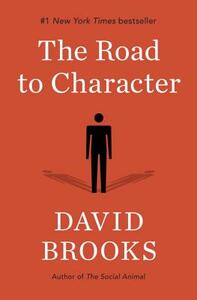Take a photo of a barcode or cover
There are parts of this book that I find incredibly interesting and parts that are not so much. I liked the beginning when he describes what character is and the differences in today's culture and those of the past. I think I would have enjoyed this more if I had read it instead of listened to it. There are parts that really drag - but I did learn some interesting facts along the way.
I was going to give this book one star because i felt like i was reading a history book, but the ending tied it together and made it a bit better.
medium-paced
I enjoyed reading this. Interesting concept to view historic figures through what Brooks perceives to be “character.”
The intro was very thoughtful and well done, but I felt the books core dragged at times. A bit slow and focused on fitting a narrative to his stories.
The best part of the book is the wonderful references to other works. I don’t mean this as sarcastic as it might seem. Brooks has obviously read a lot and his references to other works has given me several good books and essays to explore. See my review of “The Lonely Man of Faith.”
The intro was very thoughtful and well done, but I felt the books core dragged at times. A bit slow and focused on fitting a narrative to his stories.
The best part of the book is the wonderful references to other works. I don’t mean this as sarcastic as it might seem. Brooks has obviously read a lot and his references to other works has given me several good books and essays to explore. See my review of “The Lonely Man of Faith.”
challenging
emotional
inspiring
reflective
medium-paced
The Road to Character is a beautiful book, very different to the normal “self-help” book and very inspiring.
The first and last chapters definitely make it a 5 star book, he says in the introduction that it is written so you can skip the middle chapters, that is well worth doing.
I really enjoyed the middle chapters, a list of case studies of people with strong character, all very interesting and amazing how different they are.
Would absolutely recommend
The first and last chapters definitely make it a 5 star book, he says in the introduction that it is written so you can skip the middle chapters, that is well worth doing.
I really enjoyed the middle chapters, a list of case studies of people with strong character, all very interesting and amazing how different they are.
Would absolutely recommend
Really, really good. Provides lots to think about, and isn't as one sided as many of the reviews on this page claim... Although I will confess that it would be easy to draw the wrong conclusions from the book, since Brooks kind of pokes into weird directions sometimes.
Struggling with whether to give this 3 or 4 stars. The underlying message - "The mental space [and I would add time spent in life] that was once occupied by moral struggle has gradually become occupied by the struggle to achieve" - is a much needed message, along with the comparison of Adam I and Adam II in a meritocracy. There are some troubling aspects, especially in the early chapters, among them an overemphasis on the merits of struggling - not addressing the problem that suffering can break people as well as build character. There is also a hint of "things were better then" in some of the mini-biographies, especially in reference to over-praising children and in the lauding of the quality of self-effacement (which he ties to the admirable quality of humility, but can also lead to oppression and humiliation). However, those last two troublesome areas are addressed nicely in the final chapters. Overall, there were more engaging and thought-provoking parts than troublesome. So, make sure to read through to the end - it's well worth it.
informative
inspiring
fast-paced
We heard David Brooks speak last year after this book came out, and the topic piqued my interest. The book contrasts "resume virtues" (outward success) with "eulogy virtues" (inner character). He illustrates through brief biographies of assorted historical figures how each of them achieved strong character through their experiences and struggles in life. Since each profile is just one chapter long, it's an easy and interesting read, and I learned a lot from each of their stories. But mostly I just found the whole topic very thought-provoking and worthy of discussion. I noticed that the Goodreads reviews are fairly polarized - people either loved the book or hated it. This book is not for everyone, but I really liked it.
informative
reflective
slow-paced

